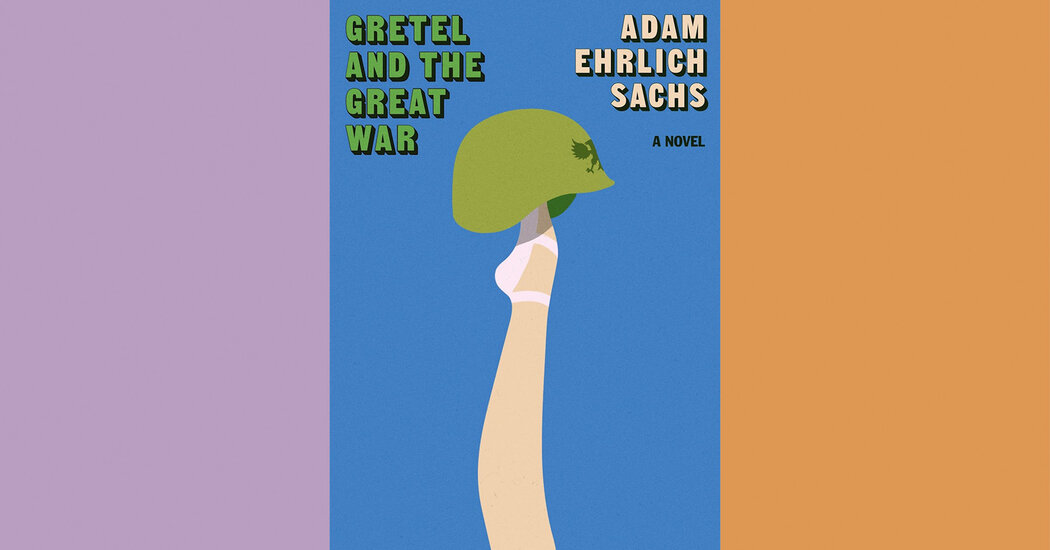
GRETEL AND THE GREAT WAR, by Adam Ehrlich Sachs
Interwar Austria — baroque, violent, demented, doomed — flickers into view in Adam Ehrlich Sachs’s new novel, “Gretel and the Great War.” No staid work of history, this. Sachs draws from the madcap, darkly comic tradition of postmodern European fiction to reimagine the continent’s catastrophic destiny.
The novel opens in November 1919, when Gretel, a young mute girl, is found wandering the streets of Vienna. The neurologist who eventually treats her receives a letter from a sanitarium patient claiming to be her father. Included in the letter is a story — “A: The Architect” — which he asks the neurologist to read to the girl as a bedtime story.
The next day brings “B: The Ballet Master,” the next “C: The Choirmaster,” and so on. Readers allergic to whimsy might bristle; how could a rondo of alphabetical tales not veer into tweeness? But the novel’s charming formal sequence conceals an eruptive, ungovernable force.
The stories, with their alliterative and sometimes zany subtitles — from “The Architect of Advanced Age at Last Builds an Abode” to “The Zionist Zigzags” — evoke both the familiarity and menace of fairy tales. They are interconnected in setting, protagonist and event, though this becomes clear only over time. The various characters — an aging starlet, the director of a theater that burns to the ground, a possibly pedophilic painter, a duchess who nurtures a porcelain doll, a murdered toymaker — circle one another ominously. Taken singly they are toylike, parabolic oddities. Together they reveal the cracked facade of the “contrived, hypocritical, highly populated city.”
The stories rarely finish where they seem to be heading. Reversals of fortune abound. Characters seek solutions to a baffling, largely unstable world. A physiology student seeks to “reupholster” reality by overhauling language, cutting away all that is dead or redundant; a dance instructor discovers a “realm of naturalness and simplicity” through the study of human movement.
The topsy-turvy, paranoid society they describe intimates the larger psychic darkness consuming Vienna, that of the merciless war they’ve only recently suffered and the larger conflict they cannot yet envision. Our foreknowledge of the fascist wave on the horizon stirs sympathy and angst, even if — as when a tormented obstetrician places a bomb inside the head of the duchess’s doll — we can only await the inevitable carnage.
In one of the chilling final stories, the sanitarium patient recounts how he took Gretel to the theater to see her estranged mother perform. Almost immediately, he notices something different about the audience: “There was not a single Czech, Pole, Slovak or Slovene, not a single Hungarian, Romanian, Ruthenian or Croat. There were only German-Austrians.” Anschluss has arrived, the “blood and soil” unification of the Volk.
The girl and her father try to leave but find all exits blocked. From the stage, Gretel’s mother sees them, pointing and shrieking before fainting dead away. The crowd turns to look, furious, threatening. Hatred isolates the family like a spotlight. “We were no longer the Duke’s loyal subjects!” Gretel’s father says. “We were Yids, Gretel, that’s all. Three noisy Yids making a scene at the theater.”
Throughout, we feel the author’s personal stake in this narrative. Like Thomas Bernhard before him, Sachs is a very funny writer unafraid of italics and exclamation marks, which he marshals against the absurdity of the world. The narrator often partakes of his characters’ exasperations, freely inhabiting the ignominy of perceived slights and failures. The novel’s staccato use of white space — every paragraph starts after an extra line break — only heightens the effects of authorial intervention.
The central characters of “Gretel and the Great War” seem to be listing reasonable assertions against an unreasonable world. Their delusions, though, are finally untenable. They present their evidence to an empty court.
GRETEL AND THE GREAT WAR | By Adam Ehrlich Sachs | FSG Originals | 213 pp. | Paperback, $18






